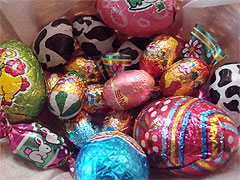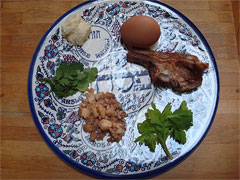God Won’t Mind
“But why do I have to go to the Jesus class?” Buddy-roo whined.
Religious instruction is an optional class at their school and Short-pants is excused from it because we opted to schedule her viola lesson at that time, to avoid an evening commitment at the conservatory. The reason Buddy-roo attends the class: convenience. It’s part of our strategy to limit the number the days when they get out of school at different times (it already happens twice a week) in order to make end-of-the-day school pick-up less complicated. Besides, a little religious instruction won’t hurt Buddy-roo. She’s the rebellious type; this will give her something to reject later in life. As De-facto says, we might as well put up a couple of false walls, ahead of ourselves.
“Well anyway,” she said, “I know that there are two Jesuses. The one that died on the cross, and the one you talk about when you’re mad.”

Oh, yes, that Jesus.
I guess you could say we’re not particularly religious. I was more spiritual before I had children, when I had the time to meditate and read provocative books by the Dalai Lama, Carlos Castaneda and Eckhart Tolle. Children may be closer to the spirit – miracles that they are – but I’ve found that having them gives me much less time for such sacred contemplation.
Short-pants practices her own religion of angels, healing energy and metro tickets, much of it the result of her hospital experience and fueled by our belief that the intentions and prayers of all the people who were rooting for her recovery created an energy that was directed at her and absolutely made a difference. Buddy-roo prays at the altar of our DVD player, finding meaning in the plots of every movie she watches. Her favorite film of the week, appropriately, is The Ten Commandments.
I am the product of a mixed marriage: a Jewish mother and a Catholic father. I know the Jewish faith claims me because of maternal lineage, but there was no temple in my rural hometown and only a handful of Jews. What I knew about the Jewish faith was Chanukah and Passover. Rosh Hashanah and Yom Kippur were remotely in my awareness only because they were printed on a calendar my mother used to mark her appointments.
So my brother and sister and I were baptized and fulfilled the sacraments of the Catholic Church, not because my father was so devout, but because those rituals teach lessons about life, about coming of age, taking responsibility, being a kind and responsible Christian (as opposed to a gun-brandishing, tea-bagging Christianist). And as my father used to say, “Church is a good place to think. The phone doesn’t ring. Nobody interrupts you.”
One thing my father and De-facto’s had in common – and they never knew each other – was a penchant for ditching church early, after communion. After receiving the host, we’d walk with hands folded and heads bowed to the transept and out the side door. In the winter, we’d be the family clumping down the aisle in our laced-up ski boots, making our early exit to drive right to the small mountain 45-minutes away for a few Sunday runs.
When my mother was dying, she consulted with a friend, a Jewish history professor, about what she might suggest to us to bring a few Jewish customs into her memorial service. He wondered about having a minyan to pray for her, but worried that it might be hard to collect ten adult Jews from our community. In the end, he advised her that the minyan could be constructed of people from any faith, because, “God won’t mind.”
This is the kind of religious tolerance I grew up with, and that I hope to pass on to my children. Our girls get a goulash of religion: They go to a Catholic school (it helps that it has a strong English section). We live in the pletzl, in  heart of the Jewish quarter and we have Muslim neighbors. We trim a Christmas tree and we light the menorah. We color Easter eggs and eat matzah. We did our own truncated version of the Haggadah at our Passover Seder. We’re doing an Easter feast (and Ricky’s roasting the lamb). And why not? It’s all very Cambellian in our home.
heart of the Jewish quarter and we have Muslim neighbors. We trim a Christmas tree and we light the menorah. We color Easter eggs and eat matzah. We did our own truncated version of the Haggadah at our Passover Seder. We’re doing an Easter feast (and Ricky’s roasting the lamb). And why not? It’s all very Cambellian in our home.

Earlier this week I was at the local butcher shop buying a bone for our Seder plate. I was waiting patiently for my turn – not an easy task when it felt like the butcher was taking his time, entirely unconcerned that the line of customers in his narrow little shop was spilling out into the street. I reminded myself to just keep smiling. Demonstrating exasperation in this situation only invites condescension. Not that being patient ensures you will be treated kindly. But it puts the odds slightly in your favor.
When I was next to be served, I took a deep breath. I’d rehearsed my appeal, having been rejected at two other butcher shops the day before.
“Pardon me, sir, I hope you can help me. Do you, by any chance, have a zeroah?”
He stared at me like I was from the Vatican.
“Mais, non,” he scolded, “C’est vachement trop tard.”
Yes, I’ve been told it’s too late. But I’ve been a very busy half-goyim, and this weekend is the only time my Jewish friend, who’s also very busy, and I could organize ourselves to do our Pesach. And anyway, isn’t it enough that I’m trying to carry on the ritual and pass it down to my children? Isn’t that the idea anyway, tell your sons and all? Does it matter if it’s early or late?
“Jesus H. Christ on a Crutch.” I said. (Not out loud though.)
He continued to stare at me, waiting for me to leave, boneless.
“I realize this is very unusual,” I said, not really meaning it. I thought you could celebrate a Seder anytime you wanted during Passover. “But due to personal circumstances, this is how it must be in our home this year. Wouldn’t you please suggest to me another kind of bone I might use? I’d like my children to experience the Seder.”
He shrugged that brilliant gesture of indifference that is part of the French genetic code and suggested a small lamp chop. I nodded.
“It’s okay,” I said to him, as he was wrapping it up in butcher paper. “God won’t mind.”


April 4th, 2010 at 11:32 pm
Thanks for clearing up the “Two Jesus” things…suddenly, religion makes sense. I’m pretty sure that God loves this, and I’m 100% that I do!! (Oh, and nice Seder plate with the lamb chop!!)
April 5th, 2010 at 2:58 am
I so enjoy your blog. It reminds me of my time in our little building. Sego told me who bought my old place. How cool. Love to you and your family.
April 5th, 2010 at 3:18 pm
I agree with you! God doesn’t mind and all the angels just keep dancing! You would enjoy Mimi Doe’s book called “10 principles to spiritual parenting”, I think I may have given you a copy years ago. xx
April 5th, 2010 at 3:23 pm
You did give the 10 Principles of Spiritual Parenting and it was a good read. Now i want to read it again!
April 17th, 2010 at 4:20 pm
I am a big believer in the idea that God is far more flexible, loving, and accepting than we here on Earth have made him/her/it out to be. Amen.
April 19th, 2010 at 8:05 pm
Thanks for clearing up the “Two Jesus” thing…suddenly, religion makes sense. I’m pretty sure that God loves this, and I’m 100% that I do!! (Oh, and nice Seder plate with the lamb chop!!)